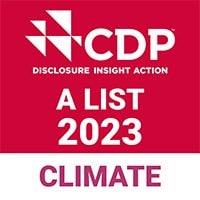Yamaha Group Selected as Prestigious "A" List Company for Climate Change by CDP
Yamaha Corporation (hereinafter "Yamaha") has been recognized for leadership in corporate sustainability by CDP*1, an international environmental non-profit organization, as a "CDP 2023 Climate Change A List" company for its proactive initiatives and transparency regarding climate change. This is the second time Yamaha is included in the A list following 2021.

Approximately 23,000 major companies around the world responded to this year's CDP Climate Change Survey. The companies were evaluated on an eight-point scale from D- to A, with the highest honorable "A List" being awarded to 346 companies worldwide, including 109 companies in Japan.
Rapid climate change poses a major threat to humanity and to all life-forms on earth. Yamaha recognizes that helping combat this threat and contributing to the decarbonization of society are corporate responsibilities and important management issues.
The Group supports the realization of a sustainable society and regards its response to climate change, the sustainable use of timber, resource savings, the reduction of waste and hazardous substances as its environmental materialities, with the aim of achieving the "Well-Being of People around the World."
Yamaha is committed to the set target of achieving net zero emissions by 2050, including along the value chain, and has set a medium-term goal of a 55% reduction in Scope 1+2*2 greenhouse gas emissions and a 30% reduction in Scope 3*2 emissions by FY2030 ending March 2031 compared to FY2017 (SBTi-certified 1.5°C-aligned targets*3). Yamaha is also focusing on the preservation and restoration of ecosystems and will continue to take steady and lasting actions toward decarbonization and nature positivity, such as actively promoting the use of certified timber and other sustainability-conscious wood products.
Please see the following website to learn more about our efforts to mitigate and adapt to climate change.
[Climate Change Mitigation and Adaptation]
*1: CDP is an international non-profit organization with global systems supporting companies and local governments' environmental disclosure. Since its establishment in 2000, CDP has led initiatives to leverage capital markets and corporate purchasing power to encourage companies to disclose their environmental impact, reduce greenhouse gas emissions and preserve water resources and forests. It currently works with more than 740 signatory financial institutions holding over 136 trillion US dollars in assets. In 2023, more than 24,000 organizations disclosed their environmental information through CDP questionnaires, including more than 23,000 companies representing two-thirds of the world's market capitalization and 1,100 local governments. CDP owns the world's largest environmental database based on its fully TCFD-compliant questionnaires, and CDP scores are widely used in investment and procurement decisions to build a net-zero, sustainable and resilient economy. CDP is a founding member of the Science Based target initiative (SBTi), We mean Business Coalition, The Investor Agenda, and the Net Zero Asset Managers initiative (NZAM). Please see the following website for details:
*2: Scope 1: Direct emissions from a company's own facilities from fuel combustion and other sources
Scope 2: Indirect emissions from purchases of energy (electricity, steam, etc.)
Scope 3: Indirect emissions other than Scope 1 and 2 (raw materials, parts procurement, transportation, product use, etc.) from a company's own value chain
*3: The Science Based Targets initiative (SBTi) promotes the setting of science-based greenhouse gas reduction targets and evaluates and approves these targets in an effort to achieve the Paris Agreement targets. SBTi was established in 2015 jointly by four organizations: Carbon Disclosure Project (CDP), an international NGO focused on the disclosure of environmental information, United Nations Global Compact, World Resources Institute (WRI), and World Wide Fund for Nature (WWF). 1.5°C-aligned targets refer to science-based reduction targets aiming to limit global warming to 1.5°C above pre-industrial levels.
